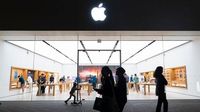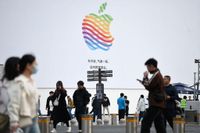In a dramatic turn of events, U.S. President Donald Trump has unleashed a series of tariffs that threaten to significantly impact the technology industry, particularly Apple Inc. The tariffs, announced during what Trump dubbed "Liberation Day," are set to increase tariffs on Chinese imports to a staggering 104 percent starting April 9, 2025. This move has already sent shockwaves through the market, leading to a substantial drop in Apple’s stock and raising concerns about the future pricing of its products.
As the world's most valuable public company, Apple has been a bellwether for the tech industry, and its recent struggles reflect broader market anxieties. Following Trump's tariff announcement, Apple shares fell by 5% on April 8, pushing its market capitalization below $2.6 trillion, just behind Microsoft’s $2.65 trillion. This decline has resulted in nearly $775 billion being wiped off Apple’s market value, marking its worst market cap fall on record.
Analysts are warning that if Apple were to shift its manufacturing base to the U.S., the price of an iPhone could skyrocket to around $3,500. Dan Ives, global head of technology research at Wedbush Securities, expressed skepticism about the feasibility of U.S.-made iPhones, stating, "You build that (supply chain) in the U.S. with a fab in West Virginia and New Jersey. They’ll be $3,500 iPhones." He emphasized that replicating the complex production ecosystem currently established in Asia would take significant time and investment.
The tariffs have not only affected Apple’s stock but have also raised questions about the company’s pricing strategy moving forward. Economists estimate that the price of a $1,000 iPhone could increase by $250 or more if the tariffs persist. This potential price hike is causing consumers to act quickly; many are rushing to upgrade their devices before the tariffs take effect. Steven Rubio, a retiree, shared his experience: "We thought: ‘We better just go and grab it now.’" This sentiment is echoed by many consumers who are eager to insulate themselves from the impending price increases.
Apple has spent the past two decades building a complex supply chain primarily in China and Southeast Asia. Approximately 90% of iPhones are assembled in China, and the company has been diversifying its manufacturing base by ramping up production in India and Vietnam. However, with the new tariffs applying to these countries as well, Apple’s strategy appears to be under threat. Trump’s tariffs on Vietnam stand at 46%, while India faces a 26% tariff.
In response to the looming tariffs, Apple is reportedly increasing iPhone shipments from India to the U.S. as a temporary workaround. However, analysts like Laura Martin from Needham are skeptical about the feasibility of shifting production entirely to the U.S. She stated, "I don’t think that’s a thing," warning that relocating Apple’s supply chain would be a years-long process, if possible at all. Martin estimated that Trump’s tariffs could drive Apple’s production costs up by roughly 50%.
Despite the challenges, Apple has committed to investing $500 billion in the U.S. over the next four years, a move that Trump has lauded. During his speech, Trump highlighted this investment as a sign of the administration’s success in bringing jobs back to America. However, the reality of manufacturing in the U.S. poses significant challenges due to higher labor costs and logistical complexities.
The uncertainty surrounding Apple's supply chain and the potential for increased prices has led to a broader market sell-off. The tech sector, particularly the group of companies known as the "Magnificent Seven," has been hit hard, with Apple emerging as the worst performer. Tesla, Amazon, Nvidia, and Meta Platforms have also experienced declines, as investors reassess the impact of tariffs on their earnings.
As the tariffs officially take effect, the tech industry is bracing for a challenging landscape. Apple’s reliance on China for manufacturing and its efforts to diversify production are now facing significant headwinds. The company’s ability to navigate this new tariff environment will be crucial for its future profitability and market position.
In the coming weeks, all eyes will be on Apple as it navigates the fallout from these tariffs. Analysts will be watching for any emergency notifications regarding substantial impacts on revenue or last-minute exemptions from the Trump administration. Ultimately, how Apple responds to these challenges will set the tone for the tech industry at large and could reshape its pricing strategies for years to come.







